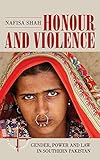Honour and Violence : Gender, Power and Law in Southern Pakistan / Nafisa Shah.
Material type: TextSeries: New Directions in Anthropology ; 39Publisher: New York ; Oxford : Berghahn Books, [2016]Copyright date: ©2016Description: 1 online resource (302 p.)Content type:
TextSeries: New Directions in Anthropology ; 39Publisher: New York ; Oxford : Berghahn Books, [2016]Copyright date: ©2016Description: 1 online resource (302 p.)Content type: - 9781785330810
- 9781785330827
- Dispute resolution (Law) -- Pakistan -- Sindh
- Family violence -- Pakistan -- Sindh
- Honor killings -- Pakistan -- Sindh
- Violence -- Pakistan -- Sindh
- Women -- Legal status, laws, etc -- Pakistan -- Sindh
- Women -- Legal status, laws, etc. -- Pakistan -- Sindh
- SOCIAL SCIENCE / Women's Studies
- Anthropology (General), Gender Studies and Sexuality
- 362.82/92095491
- HV6197.P182 S57 2016
- HV6197.P182
- online - DeGruyter
| Item type | Current library | Call number | URL | Status | Notes | Barcode | |
|---|---|---|---|---|---|---|---|
 eBook
eBook
|
Biblioteca "Angelicum" Pont. Univ. S.Tommaso d'Aquino Nuvola online | online - DeGruyter (Browse shelf(Opens below)) | Online access | Not for loan (Accesso limitato) | Accesso per gli utenti autorizzati / Access for authorized users | (dgr)9781785330827 |
Frontmatter -- Contents -- Figures, Maps and Tables -- Preface -- Acknowledgements -- Note on Sindhi Language and Transliteration -- Abbreviations -- Introduction. Honour Violence, Law and Power in Upper Sindh -- PART I A FRONTIER OF HONOUR VIOLENCE: THE PROBLEM OF KARO KARI IN UPPER SINDH -- Chapter 1 Ghairat, Karo Kari and the Spectacles of Violence: How Men and Women Become Black -- Chapter 2 Honour Violence, Law and Moral Power in Colonial Sindh -- PART II HONOUR, MORAL POWER AND LAW: MIRRORING OF LAW IN THE FORMS OF VIOLENCE -- Chapter 3 Karo kari, Wali and Family Violence: Cultural Violence Mirroring Law -- Chapter 4 Violence, Kin Groups and the Feud: The Making of Frontier Justice -- PART III NORMALIZING VIOLENCE: THE EVERYDAY WORLD OF UPPER SINDH -- Chapter 5 Mediations on the Frontier: Ceremonies of Justice, Ceremonies of Faislo and the Ideology of Kheerkhandr -- Chapter 6 The Criminal Justice and ‘Legal’ Contests of Honour: Two Case Studies -- Chapter 7 The Sound of the Silence: Lives, Narratives and Strategies of Runaway and Missing Women of Upper Sindh -- Conclusion. Karyan Ja Kabrustan: The Imaginary Burial Grounds for Black Women -- Appendices -- Appendix I. The Sindh Frontier Regulation, 1872 -- Appendix II. Extracts of Provisions of Qisas and Diyat Inserted into the Pakistan Penal Code, Including Subsequent Amendments -- Appendix IIIA. Disposal of Karo Kari Cases, 1995–2004 -- Appendix IIIB. A Sample with Details Showing Relationship of Victim, Accused and Complainant -- Glossary -- Bibliography -- Index
restricted access online access with authorization star
http://purl.org/coar/access_right/c_16ec
The practice of karo kari allows family, especially fathers, brothers and sons, to take the lives of their daughters, sisters and mothers if they are accused of adultery. This volume examines the central position of karo kari in the social, political and juridical structures in Upper Sindh, Pakistan. Drawing connections between local contests over marriage and resources, Nafisa Shah unearths deep historical processes and power relations. In particular, she explores how the state justice system and informal mediations inform each other in state responses to karo kari, and how modern law is implicated in this seemingly ancient cultural practice.
Mode of access: Internet via World Wide Web.
In English.
Description based on online resource; title from PDF title page (publisher's Web site, viewed 25. Jun 2024)


